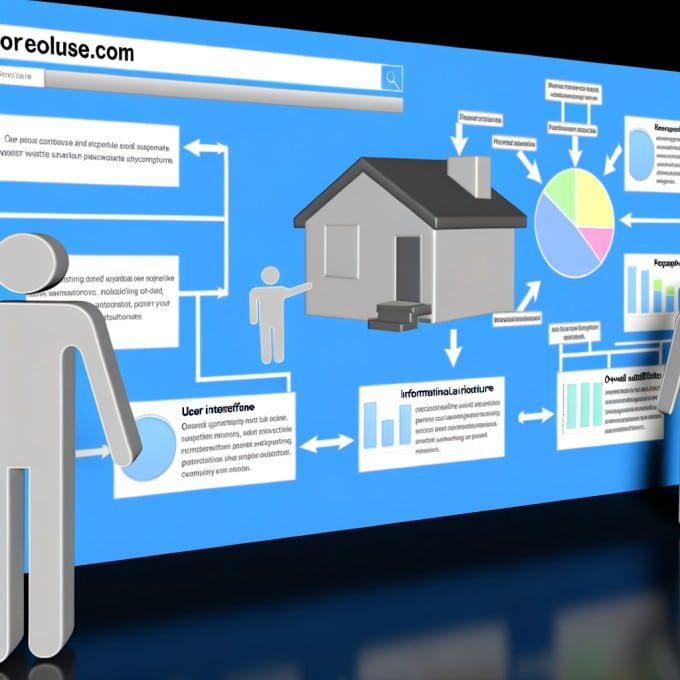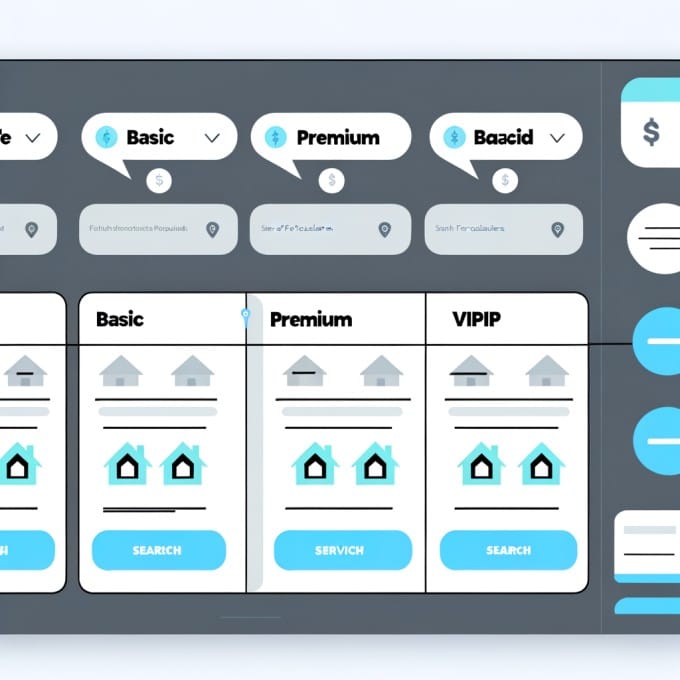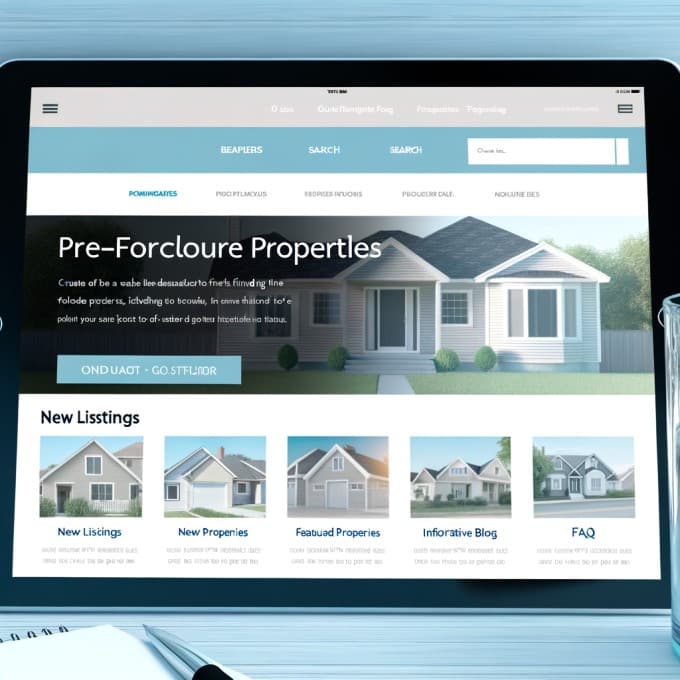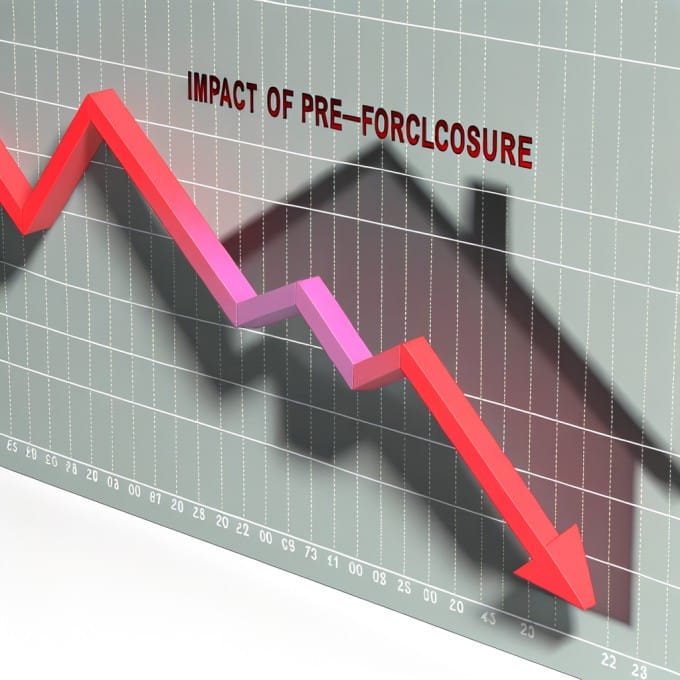Comprehensive Foreclosure.com Review: A Detailed Analysis

Table of Contents
In today’s complex real estate market, many individuals and investors are turning to online resources to find potential property deals, including foreclosures. One prominent website providing a comprehensive database and a variety of tools for such purposes is Foreclosure.com. This review intends to offer a detailed analysis of Foreclosure.com, focusing on its services, features, user experience, and pricing plans.
Introduction to Foreclosure.com Services
Foreclosure.com is a leading platform dedicated to providing extensive listings of distressed properties, including foreclosures, pre-foreclosures, bankruptcies, and tax liens. The website serves as a one-stop resource for individuals seeking to purchase properties below market value. With a wide-reaching database, Foreclosure.com aims to make accessing distressed property listings straightforward and efficient.
The scope of Foreclosure.com’s services extends beyond merely listing properties; it also offers tools and resources to help users make informed decisions. These include detailed property descriptions, historical data, and comparable sales information. The platform also provides educational content on the foreclosure process, financing options, and legal considerations, making it a valuable resource for both novice and experienced investors.
Apart from individual buyers, Foreclosure.com caters to real estate professionals, offering them robust tools for client management and investment analysis. The site’s comprehensive search functionality allows users to filter properties by multiple criteria, such as location, price range, and property type. This helps streamline the search process, making it easier for users to find properties that meet their specific needs.
Another significant aspect of Foreclosure.com’s service model is its commitment to maintaining up-to-date and accurate listings. The platform continuously updates its database to ensure that users have access to the latest information, thereby reducing the risk associated with purchasing distressed properties.
Key Features and Benefits of Foreclosure.com
One of the standout features of Foreclosure.com is its extensive and diverse property database. Users gain access to millions of listings nationwide, covering various types of distressed properties. This wide range ensures that users can find potential investments in their desired locations, whether they are looking for residential, commercial, or land properties.
The platform also offers powerful search and filtering capabilities. Users can refine their searches based on numerous criteria, such as property type, price range, location, and foreclosure stage. This advanced search functionality enables users to quickly narrow down potential investments that fit their specific requirements, saving time and effort.
Foreclosure.com goes beyond listings by providing detailed property information. Each listing includes essential details such as property description, historical data, nearby comparable sales, and tax assessment information. This comprehensive data helps users conduct thorough due diligence and make informed decisions about potential investments.
Another significant benefit is the educational resources available on Foreclosure.com. The platform offers a wealth of articles, guides, and tutorials on various aspects of real estate investing, particularly in distressed properties. These resources are invaluable for users who are new to the foreclosure market, providing them with the knowledge needed to navigate the complexities of such transactions.
User Experience and Interface Evaluation
Foreclosure.com boasts a user-friendly interface designed to facilitate easy navigation and efficient property searches. The homepage features a clean layout with a straightforward search bar, allowing users to start their property hunt immediately. The intuitive design ensures that even first-time visitors can quickly become familiar with the platform’s functionalities.

The site’s property listings are well-organized, with essential information prominently displayed. Users can view high-quality images, detailed descriptions, and key property data without having to click through multiple pages. This design choice enhances the user experience by making it easy to assess properties at a glance.
Foreclosure.com’s mobile compatibility is another noteworthy aspect. The platform is optimized for mobile devices, ensuring that users can access property listings and other resources on the go. The mobile interface retains the same level of functionality and ease of use as the desktop version, making it a versatile tool for busy investors.
Customer support on Foreclosure.com is robust, with multiple channels available for assistance. Users can reach out via email, phone, or live chat to get help with their inquiries. The website also features a comprehensive FAQ section, addressing common questions and issues that users may encounter. This commitment to customer service enhances the overall user experience.
Pricing Plans and Subscription Options
Foreclosure.com offers a variety of subscription plans designed to cater to different user needs. The platform provides a basic subscription that grants access to a limited number of property listings and essential tools. This option is suitable for casual users who are beginning their search for distressed properties or those with minimal investment needs.
For more serious investors and real estate professionals, Foreclosure.com offers premium subscription plans. These plans provide access to the full database of listings, advanced search features, and additional tools such as investment calculators and market analysis reports. The premium plans are priced on a monthly or annual basis, offering flexibility for users to choose a subscription period that suits their needs.

One of the attractive aspects of Foreclosure.com’s pricing model is the free trial option. New users can sign up for a trial period, during which they gain full access to the platform’s features. This allows users to evaluate the service thoroughly before committing to a paid subscription, ensuring that they find value in the offerings.
Foreclosure.com also provides discounted rates for long-term subscriptions. Users who opt for annual plans often benefit from significant savings compared to monthly subscriptions. This pricing strategy not only makes the service more affordable but also encourages users to utilize the platform over a longer period, potentially increasing their chances of finding suitable investment opportunities.
Summary
In summary, Foreclosure.com stands out as a comprehensive and user-friendly platform for accessing distressed property listings. Its extensive database, powerful search tools, and detailed property information provide significant value to both novice and experienced investors. The platform’s commitment to up-to-date listings and robust customer support further enhances its appeal. With various subscription options, including a free trial, Foreclosure.com allows users to explore its features and determine if it meets their investment needs. Whether you’re a casual buyer or a seasoned real estate professional, Foreclosure.com offers the tools and resources necessary to navigate the complex world of foreclosure properties.
FAQs
-
What is the best website to find foreclosures?

Finding foreclosed properties can be a valuable strategy for real estate investors and homebuyers looking for deals. Several websites specialize in listing foreclosures, each with its unique features and benefits. Here are some of the best websites to find foreclosures:
1. Zillow
Overview: Zillow is a well-known real estate marketplace that provides a wide range of property listings, including foreclosures.
Features: Detailed property information, photos, neighborhood data, and the ability to filter searches specifically for foreclosures.
Pros: User-friendly interface, extensive database, and additional tools like Zestimates for property value.
Cons: Some listings may be outdated or less detailed compared to specialized foreclosure sites.2. RealtyTrac
Overview: RealtyTrac is a leading foreclosure listing website that offers detailed information on properties in various stages of foreclosure.
Features: Comprehensive database, property value estimates, auction details, and access to historical foreclosure data.
Pros: Extensive and accurate foreclosure listings, valuable market insights, and a wide range of search filters.
Cons: Requires a subscription for full access to detailed property information and advanced features.3. Foreclosure.com
Overview: Foreclosure.com is dedicated to listing foreclosed homes, pre-foreclosures, bankruptcy properties, and tax lien properties.
Features: Daily updated listings, detailed property data, and educational resources on buying foreclosures.
Pros: Focused exclusively on distressed properties, comprehensive listings, and robust search functionality.
Cons: Requires a subscription to access detailed property information and premium features.4. Auction.com
Overview: Auction.com specializes in auction properties, including foreclosures and bank-owned homes.
Features: Detailed auction listings, bidding platform, property condition reports, and virtual tours.
Pros: Real-time bidding, transparent auction process, and a wide variety of properties.
Cons: Competitive bidding environment and the need for quick decision-making.5. HUD.gov
Overview: The U.S. Department of Housing and Urban Development (HUD) website lists government-owned foreclosed homes available for sale.
Features: Listings of HUD homes, buying guides, and information on special programs like the Good Neighbor Next Door.
Pros: Access to government-owned properties, special programs for specific buyers, and no subscription fees.
Cons: Limited to HUD-owned properties and less user-friendly compared to commercial sites.6. Bank Websites
Overview: Many banks list their foreclosed properties on their websites, including Bank of America, Wells Fargo, and JPMorgan Chase.
Features: Listings of bank-owned properties (REOs), property descriptions, and contact information for bank representatives.
Pros: Direct access to bank-owned properties and sometimes more favorable terms for financing.
Cons: Listings are often limited to the bank’s inventory and can be less comprehensive than specialized foreclosure sites.Conclusion
The best website to find foreclosures depends on your specific needs and preferences. Zillow and RealtyTrac offer extensive databases and user-friendly interfaces, while Foreclosure.com and Auction.com provide specialized listings and auction opportunities. HUD.gov is a valuable resource for government-owned properties, and checking bank websites can yield additional opportunities. Consider using multiple sources to maximize your chances of finding the best foreclosure deals.
-
What is the best website to find pre foreclosures?

Finding pre-foreclosures can be an effective strategy for real estate investors and homebuyers looking to purchase properties before they are officially foreclosed upon. Several websites specialize in listing pre-foreclosures, each offering unique features and benefits. Here are some of the best websites to find pre-foreclosures:
1. Zillow
Overview: Zillow is a well-known real estate platform that provides a wide range of property listings, including pre-foreclosures.
Features: Detailed property information, photos, neighborhood data, and the ability to filter searches specifically for pre-foreclosures.
Pros: User-friendly interface, extensive database, and additional tools like Zestimates for property value.
Cons: Some listings may be less detailed compared to specialized pre-foreclosure sites.2. RealtyTrac
Overview: RealtyTrac is a leading real estate information company that provides comprehensive data on properties in various stages of foreclosure, including pre-foreclosures.
Features: Detailed property data, foreclosure status, market trends, and historical data.
Pros: Extensive and accurate pre-foreclosure listings, valuable market insights, and a wide range of search filters.
Cons: Requires a subscription for full access to detailed property information and advanced features.3. Foreclosure.com
Overview: Foreclosure.com specializes in listing distressed properties, including pre-foreclosures, foreclosure auctions, and bank-owned homes.
Features: Daily updated listings, property details, market analysis tools, and educational resources.
Pros: Focused exclusively on distressed properties, comprehensive listings, and robust search functionality.
Cons: Requires a subscription to access detailed property information and premium features.4. Auction.com
Overview: Auction.com specializes in auction properties, including pre-foreclosures and bank-owned homes.
Features: Listings of properties headed to auction, property condition reports, bidding platform, and virtual tours.
Pros: Real-time bidding, transparent auction process, and a wide variety of properties.
Cons: Competitive bidding environment and the need for quick decision-making.5. PropStream
Overview: PropStream is a real estate investment software that provides access to a comprehensive database of pre-foreclosures, along with other property types.
Features: Property search and analysis, lead generation, market data, and marketing tools.
Pros: Advanced property data, powerful analytics, and tools for direct mail and email marketing.
Cons: Requires a subscription, which can be costly for some users.6. HUD.gov
Overview: The U.S. Department of Housing and Urban Development (HUD) website lists government-owned properties, including those in pre-foreclosure stages.
Features: Listings of HUD homes, information on buying pre-foreclosures, and special programs for specific buyers.
Pros: Access to government-owned properties, special programs for buyers like teachers and law enforcement officers, and no subscription fees.
Cons: Limited to HUD-owned properties and less user-friendly compared to commercial sites.Conclusion
The best website to find pre-foreclosures depends on your specific needs and preferences. Zillow and RealtyTrac offer extensive databases and user-friendly interfaces, while Foreclosure.com and Auction.com provide specialized listings and auction opportunities. PropStream offers advanced data and marketing tools for serious investors, and HUD.gov provides access to government-owned properties. Using a combination of these sources can increase your chances of finding the best pre-foreclosure deals.
-
Does pre foreclosure hurt your credit?

Pre-foreclosure is the stage in the foreclosure process where the homeowner has fallen behind on mortgage payments, but the property has not yet been repossessed or sold at auction by the lender. This period typically begins when a homeowner misses several mortgage payments and receives a notice of default from the lender. During pre-foreclosure, the homeowner has the opportunity to rectify the situation by paying the overdue amount, selling the property, or negotiating with the lender.
Impact on Credit Score
Missed Mortgage Payments:
Initial Impact: Missing mortgage payments is the primary factor that affects your credit score during pre-foreclosure. Lenders usually report a missed payment to the credit bureaus once it is 30 days late. Each missed payment can significantly lower your credit score, with larger drops for those who previously had higher credit scores.
Cumulative Effect: Consecutive missed payments (60, 90, 120 days, etc.) will continue to negatively impact your credit score, compounding the damage.Notice of Default:
Legal Notice: A notice of default is a formal declaration that the lender intends to foreclose on the property due to non-payment. This notice is often recorded in public records and may be reported to the credit bureaus.
Credit Report: The appearance of a notice of default on your credit report is a serious negative mark, further lowering your credit score.Public Records:
Impact: Foreclosure-related notices, including pre-foreclosure notices, are considered public records. Public records on your credit report can significantly impact your creditworthiness and remain on your report for up to seven years.
Severity: The severity of the impact depends on various factors, including the number of missed payments and the overall credit history of the individual.Long-Term Consequences
Credit Recovery:
Time to Heal: Recovering from the negative impact of pre-foreclosure on your credit score can take time. Even if you manage to avoid foreclosure by selling the property or catching up on payments, the missed payments and notices can stay on your credit report for several years.
Credit Rebuilding: Engaging in credit-rebuilding activities, such as making timely payments on other debts, reducing credit card balances, and managing finances responsibly, can gradually improve your credit score over time.Future Loan Approval:
Loan Applications: Lenders will see the history of missed payments and pre-foreclosure notices when reviewing your credit report for future loan applications. This history can make it more challenging to qualify for new loans or credit, and you may face higher interest rates or less favorable terms.
Mortgage Qualification: Obtaining a new mortgage can be particularly difficult, as lenders view a history of mortgage delinquency as a significant risk factor.Mitigating the Damage
Communication with Lender:
Proactive Steps: Communicating with your lender as soon as you realize you may miss a payment can sometimes result in options that can prevent a notice of default. Lenders may offer loan modifications, forbearance, or other repayment plans.
Negotiation: Successfully negotiating with the lender to catch up on missed payments or modify the loan terms can prevent further negative marks on your credit report.Selling the Property:
Short Sale: Selling the property before it goes into full foreclosure, often through a short sale (where the lender agrees to accept less than the amount owed on the mortgage), can prevent a foreclosure from appearing on your credit report. While still negative, a short sale is generally less damaging than a full foreclosure.
Legal and Financial Advice:
Professional Help: Consulting with a credit counselor, real estate attorney, or financial advisor can provide guidance on the best steps to take during pre-foreclosure to mitigate damage to your credit score.
Conclusion
Pre-foreclosure can significantly hurt your credit due to missed mortgage payments and the issuance of a notice of default. The impact can be long-lasting, affecting your ability to secure future loans and resulting in higher interest rates. However, by taking proactive steps, communicating with your lender, and seeking professional advice, you can mitigate some of the negative effects and work towards rebuilding your credit over time.
-
What are the negative effects of foreclosure?

Foreclosure is a legal process in which a lender attempts to recover the balance owed on a loan by taking ownership of the property used as collateral. This process typically begins after a homeowner misses several mortgage payments and is unable to make up the overdue amount. The negative effects of foreclosure are significant and multifaceted, impacting various aspects of a homeowner’s life, from financial stability to personal well-being.
Financial ImpactCredit Score Damage:
Immediate Impact: Foreclosure can cause a substantial drop in your credit score, often by 100 to 160 points or more, depending on your credit history before the foreclosure.
Long-Term Impact: The foreclosure will remain on your credit report for seven years, making it challenging to secure new credit and resulting in higher interest rates and less favorable terms.Difficulty Obtaining Future Loans:
Mortgage Qualification: Securing a new mortgage after foreclosure is particularly difficult. Many lenders impose a waiting period of several years before considering an application from someone with a foreclosure on their record.
Other Loans: Obtaining other types of loans, such as auto loans or personal loans, can also be challenging, with higher interest rates and stricter terms.Increased Insurance Premiums:
Credit-Based Insurance Scores: Many insurance companies use credit-based insurance scores to determine premiums. A foreclosure can lead to higher premiums for homeowners, auto, and other types of insurance.
Tax Implications:
Cancellation of Debt Income: If a lender forgives any part of your mortgage debt, the forgiven amount might be considered taxable income, leading to a significant tax liability.
Personal and Emotional Impact
Stress and Anxiety:
Financial Strain: The financial pressures leading up to and following a foreclosure can cause significant stress and anxiety.
Uncertainty: The uncertainty about where to live next and the process of finding new housing can add to the emotional toll.Loss of Home:
Displacement: Losing your home can be a traumatic experience, especially if you have lived there for many years or raised a family there.
Relocation Challenges: Finding and moving to a new place can be difficult, particularly with damaged credit and limited financial resources.Impact on Family:
Disruption: Foreclosure can disrupt family life, causing children to change schools and affecting their emotional well-being.
Relationships: The stress of foreclosure can strain relationships with family and friends.Social and Community Impact
Social Stigma:
Perception: Foreclosure can carry a social stigma, leading to feelings of embarrassment or shame.
Community Standing: Your standing in the community can be affected, potentially influencing social interactions and community involvement.Housing Market Impact:
Property Values: A high number of foreclosures in a neighborhood can depress property values, affecting other homeowners in the area.
Community Stability: Frequent foreclosures can destabilize communities, leading to increased crime rates and decreased investment in the area.Professional Impact
Employment Opportunities:
Background Checks: Some employers conduct credit checks as part of their hiring process. A foreclosure on your credit report can negatively impact job prospects.
Job Security: Certain professions, particularly those in finance or security-sensitive roles, may view foreclosure as a risk factor.Professional Relationships:
Networking: The stress and distraction caused by foreclosure can impact professional relationships and networking opportunities.
Productivity: The emotional and financial strain of foreclosure can affect work performance and productivity.Strategies to Mitigate Negative Effects
Prevention and Early Intervention:
Communication with Lender: If you are struggling to make payments, contact your lender early to discuss options like loan modification, forbearance, or a repayment plan.
Financial Counseling: Seek assistance from a credit counselor or financial advisor to explore options and create a plan to avoid foreclosure.Credit Rebuilding:
Timely Payments: Continue to make timely payments on other debts to gradually rebuild your credit score.
Secured Credit: Consider using secured credit cards or small installment loans to demonstrate responsible credit behavior.Tax Planning:
Consult a Tax Professional: If your mortgage debt is forgiven, consult with a tax professional to understand potential tax implications and explore any available relief options.
Emotional Support:
Counseling and Support Groups: Consider seeking emotional support through counseling or support groups to cope with the stress and emotional impact of foreclosure.
Conclusion
The negative effects of foreclosure are extensive, affecting financial stability, personal well-being, social standing, and professional opportunities. Understanding these impacts can help you take proactive steps to mitigate the damage and rebuild your life after foreclosure. Seeking early intervention, professional advice, and emotional support are crucial strategies in navigating the challenges of foreclosure.
Related Articles:
